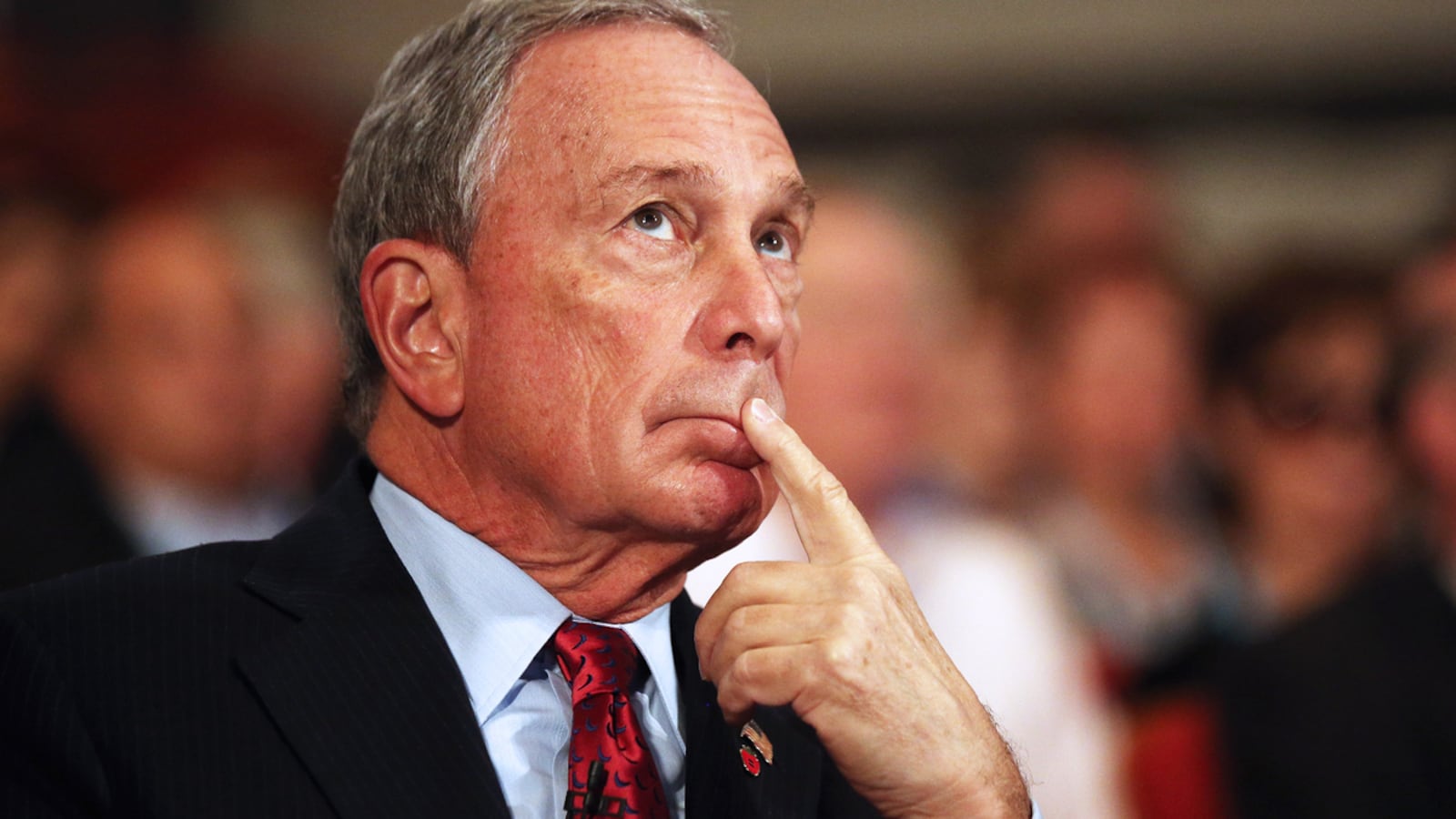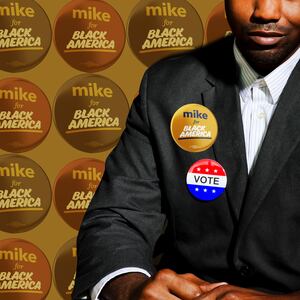GILFORD, New Hampshire—The talk of New Hampshire one day before its primary vote was a candidate who has not set foot in the state to campaign.
“No, no, no, absolutely not,” Nancy Sapack, a Democrat from Center Harbor, a tiny town in the Lakes Region, said at the mere mention of Michael Bloomberg’s name. “He’s too much of a businessman. I picture him like Trump.”
Others were less critical of the former New York City mayor, whose late 2020 bid for the White House has become less of a political pipe dream in recent weeks. Indeed, at rallies in the biggest cities and smallest towns here, where he has unabashedly decided not to compete, one thing was increasingly apparent ahead of Tuesday’s primary: Everyone The Daily Beast approached about Bloomberg had heard of him. They had seen his ads. They knew about his money. And, while he’s been rendered by most as electorally irrelevant in New Hampshire, many felt compelled to talk freely about his quest for the Democratic nomination nonetheless.
“I don’t have the disdain for him I hear a lot of other people have,” said Peter Sorrentino, a Hampton resident who is supporting entrepreneur Andrew Yang. “He’s analyzed the situation and how he believes his best chances are to become president. Good for him.”
Bloomberg’s late entry into the race has delivered a black eye to nearly every rival candidate, some of whom have lumbered here for more than a year to court voters through traditional retail politics. To that, his campaign shrugs. “While other candidates focus on New Hampshire, we’re committed to winning delegates on Super Tuesday and beating Donald Trump in November,” Dan Kanninen, Bloomberg’s states director, told The Daily Beast.
But the media mogul’s inattention here hasn’t stopped Granite Staters from noticing him. During Friday night’s debate at Saint Anselm College in Manchester, Bloomberg’s name was mentioned six times.
“I guess if you’re worth $60 billion and you can spend several hundred million dollars on commercials, you have a slight advantage,” Sen. Bernie Sanders (I-VT), a frontrunner for today’s New Hampshire primary, said to a question about incremental versus radical change. “That is nonsense.”
Having spent much of both his 2016 and 2020 bids railing against the billionaire class, Sanders made candidate Bloomberg an instant target of his fire, a dynamic that’s escalated in recent weeks. But he’s not the only one growing increasingly frustrated by the former mayor’s apparent rise. Last month, The Daily Beast reported that several of his opponents were compiling and pushing opposition research and conducting internal polling on his possible delegate hauls, signs that some are eyeing him rather cautiously. Others, like Sen. Elizabeth Warren, have taken a more vocal approach. The Massachusetts Democrat, whose anti-corruption platform and calls to get corporate money out of politics, was among the first to go negative on the man who she contended was trying to buy his way into the election.
That sense of frustration or, at times, apathy has permeated the atmosphere here. Interviews with Democratic and Independent voters across the state reveal a firm acknowledgment of Bloomberg’s ghost-like presence hovering over the primary—and a general feeling of uncertainty about what to make of it.
“Bloomberg’s going to be a force,” said Dermot Bostock, who crossed the Maine border to neighboring Portsmouth to hear Yang speak on Monday. When asked if the former mayor would be a positive or negative “force,” he paused for a moment before answering. “Hard to say,” Bostock said. “Either money’s part of the process or it’s not. And this is the big guy with the big money.”
Yang, in a brief interview with The Daily Beast, seemed equally uncertain about Bloomberg’s long-term prospects, but shifted the conversation back to the first-in-the-nation primary, where he has invested and campaigned heavily.
“Bloomberg is hovering over the field in terms of Super Tuesday, but to me it’s first things first, and the first thing right now is New Hampshire,” said Yang, whose loyal base favoring an atypical candidate has garnered more traction here than in nearly any other state. “He’s not on the ballot here in New Hampshire.”
But there are already signs Bloomberg’s money is working to persuade some voters that a 77-year-old billionaire is the right match to go up against President Donald Trump, himself a septuagenarian billionaire from New York. Will Brunkhorst, who was still undecided despite showing up to hear former Vice President Joe Biden speak in Gilford, said he’s not going to vote for Bloomberg for the obvious reason that he’s not competing here. But he, like Bostock, speculated that he may be a major contender down the line, when the electoral calculus realigns around Super Tuesday.
“It might be a head-to-head between the two of them,” Brunkhorst said about Bloomberg versus Trump.
Michael Graham, the pastor at the church where Biden spoke to a small audience gathered in the basement on Monday afternoon, said he supports former South Bend Mayor Pete Buttigieg. And he’s become increasingly irritated by Bloomberg’s seeming omnipresence.
“I’ve seen a lot of his ads,” Graham said. “I think he needs to do events like this.”
Bloomberg’s campaign has indeed been flooding the airwaves, spending heavily despite not competing in the primary. For now, it appears t0 have a ripple effect: Though he’s only been in the race less than three months, the New Yorker is now at nearly 13 percent in national averages. And recent surveys show even greater traction. In the latest Quinnipiac University poll released Monday, the ex-Republican billionaire is in third place, one percentage point ahead of Warren. But his campaign suggests it’s not just ads, pointing to several other traditional indicators of seriousness around his bid.
“Since day one, our campaign has been focused on building a nationwide operation that is engaging with voters daily about Mike’s record on key issues and why he’s the strongest Democrat in the race,” Kanninen said. In driving that point, aides note the vastness of their political shop: More than 2,100 staff in 40 states (notably, more than 450 of those are dedicated to key general-election battlegrounds). He’s won the endorsements of a strikingly large number of members of Congress and more than 60 mayors. And, in an apparent nod that the man behind the television screen is not entirely forgoing human contact, his campaign says Bloomberg has had 1 million conversations with voters.
For some voters, that face-time appears to be less important. Look no farther than Dixville Notch, whose nearly six-decade tradition of voting first in the nation just after midnight, went for Bloomberg with three write-in votes.
“WE’RE NOT COMPETING IN NH, BUT MIKE STILL WINS DIXVILLE NOTCH,” his campaign gloated in a press release early Tuesday. The other two votes—from the town’s five residents—went to Sanders and Buttigieg. None went to Biden.
When presented with the idea that Bloomberg could theoretically pull away voters from the former vice president, who has presented himself in a similarly moderate style, several Biden supporters appeared resigned to that possibility, particularly after his disappointing fourth-place showing in the Iowa caucuses last week. “To be honest with you, I’m not really thrilled about that,” said Bonnie Link-Vorel, who continues to support Biden. “I think in some respects they have similar ideas. But it’s the money thing—that you can buy your way through—that worries me.”
Susan Allen, who is also voting for the former VP on Tuesday, agreed. “It’s a shame that candidates come in at the last minute and run. It distorts the field.” In the past several days, endorsers of other candidates, including Miami Democratic State Sen. Jason Pizzo, who was previously all in for Team Joe, and Atlanta City Councilwoman Jennifer Ide, who was supporting Warren, have flipped to Bloomberg.
“I’m not saying he’s an evil man. I’m just saying we’d be awfully, really stupid to vote Bloomberg,” said John Simpson, who drove up to New Hampshire from Maryland to hear Biden and other candidates speak. “We’re awfully stupid to let him run.”
Still, others said they feel less concerned about the whole thing. Some conceded that he is, in fact, the type of candidate, a fellow billionaire like Trump, who would inspire them to support those promoting the opposite approach.
“Bernie’s pretty strong,” Marlene Brooks, a two-time Sanders supporter, said about Bloomberg after attending the Vermonter’s Rochester town hall on Saturday. “He’s going to fight hard.”









